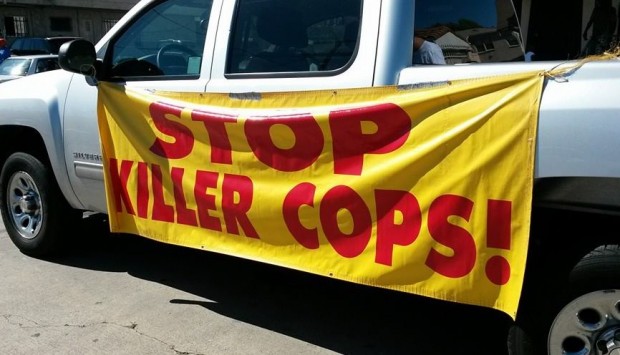Let this stand as the stupidest line in an effort to defend the cop in question: “This is a student journalist. We don’t know how much of what she wrote is true.” We are not really all that surprised that Philadelphia Police Lt. Frank Vanore thinks that might be the best way to defend a police officer who made a few racist remarks to a Temple University journalism student while she was on a ride along for a project. After all, when you have racists in the city pulling all kinds of crap while those who say they are against their activities looking the other way and doing everything they can to avoid dealing with it, slandering a young journalist to clean up your dirt would definitely be the way to go. Well, let’s hear from Bill Thrasher, the officer in question who is reported to have made the remarks that the African Americans living in the neighborhoods he patrols are “f—— disgusting” and that their problems are “typical n—– s—“. What’s typical s— is how this scenario can be played out across the country, but in Philly police seem to have made it a work of art. Well one thing for certain. Off. Thrasher won’t be seen patrolling North Philly again anytime soon. Whatever situations there are in that community, they don’t need racist cops out there making it worse.
“These people are f****** disgusting…It’s like they’re animals,” Philadelphia police officer William Thrasher allegedly said.
Thrasher, of Tacony, is a white cop in the 22nd District who allegedly feels the utmost disgust for the black residents of North Philadelphia — the people he is supposed to serve and protect. At least, that’s a Temple journalism student’s take on Thrasher after spending three hours with the officer as part of a school assignment.
Temple senior Shannon McDonald accompanied Thrasher on a ride along for a journalism college project. What McDonald says she heard during that ride was printed on a Web site for Temple’s Multimedia Urban Reporting Lab.
Thrasher is quoted in the article as saying black people’s problems are “TNS” or “typical n***** s***,” the Daily News reported when it picked up the story.
McDonald’s article landed Thrasher on desk duty.
The Guardian Civil League is now calling for his dismissal from the force, according to the paper.
“If that’s the way he feels about black people, then he needs to be off our streets…disciplinary action is a slap on the hand…they need to tell him to find a new career,” Rochelle Bilal, head of the GCL said.
Thrasher tried to defend his statements by saying he’s not racist, because he works with black people.
“I’m not racist…they have jobs, they support their families, they’re good people. Most of the people who live in this area are bad people. And they happen to be black,” he allegedly told McDonald.
Police are questioning the validity of the article, Lt. Frank Vanore told the Daily News.
“This is a student journalist,” he said. “We don’t know how much of what she wrote is true.”
Associate Journalism Professor Chris Harper edited the piece and stands by McDonald’s claims, according to the newspaper.
Thrasher was assigned to the 22nd District in November 2007. Police Internal Affairs is investigating.
Black and Blue
By Shannon McDonald
Bill Thrasher is an officer in North Philadelphia’s 22nd police district. His blonde hair is youthful, unaltered by sun or life. His eyes are identical to the sky blue of the uniform shirt he wears beneath his jacket and bulletproof vest. The faint traces of acne on his jaw reveal his age before he offers it: 24. But Thrasher’s age is irrelevant in the 22nd district, where the majority of people he deals with are younger than he is. The district’s relationship with the community is nothing short of volatile.
“People hate us here,” Thrasher says of the community’s distaste for police officers. “They spit at us.”
The region’s rocky history with the Philadelphia Police Department is no secret among the rest of city. Shootouts, police brutality and tales of each group’s hate for one another flood the media and plague Philadelphia’s reputation. There are two sides to the conflict, and Thrasher isn’t ashamed of his.
“Of the 19 or 20 homicides so far this year, six were in Strawberry Mansion,” he says. “Most were in this district.”
In the 22nd district, burglaries and drug busts are the norm, but homicides are equally prevalent. As Thrasher circles the neighborhoods, he points out recent homicide scenes.
A man was shot 19 times on the 2400 block of Nicholas Street. At 2100 Newkirk St., a 17-year-old boy was shot several times by a friend for $120. On Myrtlewood Street, a man died from multiple gunshot wounds in the stomach.
“People in this neighborhood don’t care about each other,” Thrasher says matter of factly. “They’ll shoot each other for drugs, for money, for bulls—. All they care about is their reputation. They want to look tough.”
It’s hard to tell if Thrasher’s logic is a defense mechanism for his attitude toward the neighborhood, or the sentiment of an entire district.
The stories of police brutality are easier to believe when Thrasher and his colleagues interact. “TNS” is the code they use for many of their cases. When Thrasher arrives at Arthur’s Dog House on Germantown Avenue in response to a midday call about an escalating argument; the cook greets him by saying the fighting couple has already left.
“Nobody died,” he tells her dismissively.
Thrasher’s lieutenant drives by as Thrashers slides back into the seat of his car.
“TNS,” Thrasher tells his superior. “Typical N—– S—.”
Comments like this between two white police officers in a predominantly black section of the city only add fuel to the fire. So does Thrasher’s implication that because most of the houses in the 22nd district belong to the Housing Authority, there are more instances of violent crime.
But Thrasher insists the reasons behind the prejudices are not as superficial as they appear. Take for instance, the gang at 12th Street and Hunting Park Avenue.
“They call themselves “12th and Hunt ‘Em Down,” Thrasher says with a laugh. “They’re into some heavy s—, and most of them are younger than me.”
As he drives back toward Strawberry Mansion, Thrasher continues to point out crime scenes, eager to prove his words and actions stem from 18 months of exposure to black-on-black crime, and not from racism.
He stops on the 3000 block of Page Street, a quiet block whose houses are painted every color imaginable. The car idles in front of 3039, whose inhabitants, Thrasher says, are a constant thorn in the district’s side. This is not the quiet block the residents described it at less than a week ago.
Tyrone, a lifelong resident of Page Street, said the block is mostly quiet and full of seniors. The memorial on the corner, he explained, is for Mike, a friendly guy who died after a fight with another neighbor.
Today, the memorial is gone and Thrasher laughs hard at Tyrone’s account of the story.
Michael Lane, 52, the father of 15 and with four prior arrests, was shot in the back of the head by his daughter’s boyfriend, James Moses, 50 years old, who had five prior arrests and a known associate of other ho
micide suspects.
Thrasher’s innocent eyes and baby face do little to redeem his harsh language.
“These people are f—— disgusting. It’s like they’re animals.”
Tyrone isn’t patrolling the street today, like he was last week. He is not here to explain his statements surrounding Lane’s death. Thrasher’s tone is matter of fact when he says Tyrone was probably involved in Lane’s death or some other crime he’s trying to escape.
Twenty minutes later, Thrasher and his lieutenant are defending their profession again when a mother demands to know why her two sons are consistently pulled over and arrested. The lieutenant says it’s a result of her sons’ long history with the police. The mother argues that it’s because her family is black.
The animosity between the black communities in North Philadelphia and the 22nd police district is cyclical. Crime begets more police, begets crime, and so on, but it is unclear when and where the cycle began.
Thrasher and another rookie officer exchange a wink and the TNS call after a traffic stop as Thrasher turns in the direction of headquarters to file paperwork.
“I’m not racist,” he says. “I work with black people everyday. They have jobs, they support their families, [and] they’re good people. Most of the people who live in this area are bad people. And they happen to be black.”


More Stories
AT LEAST ONE OF THE COPS WHO KILLED EZELL FORD HAS STRUCK BEFORE
PEOPLES' MONDAY HONORS FALLEN VICTIMS IN NYC
PA STATE REP: 'A WHITE NATIONALIST…IS A LOT DIFFERENT THAN A WHITE SUPREMACIST'